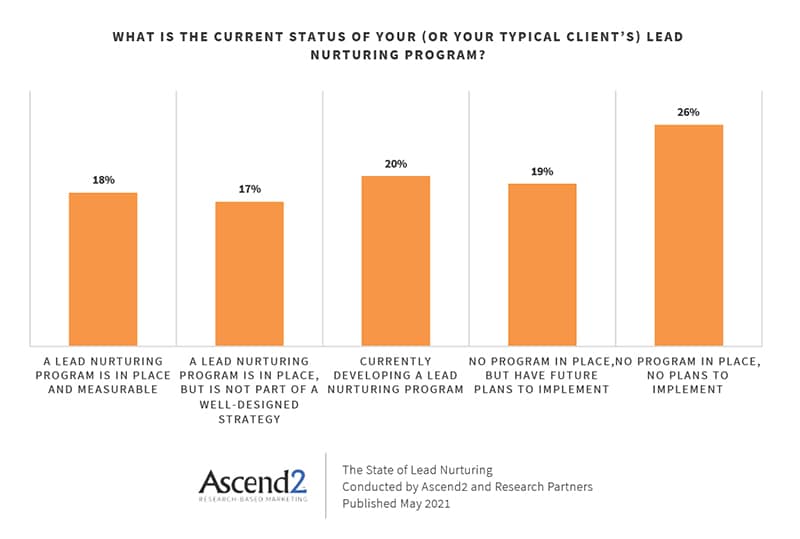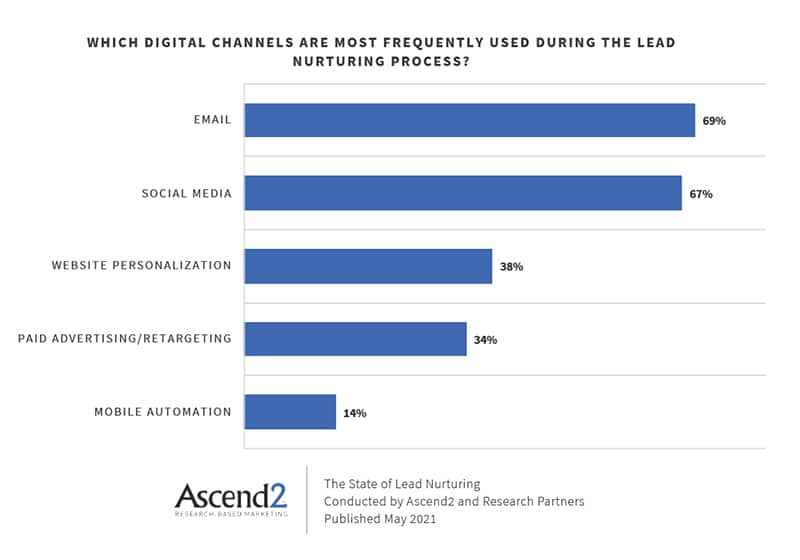
It is a marketer’s job to provide prospective customers with targeted information in the form of engaging content to help make their purchase decision as smooth as possible. But this process, known as lead nurturing, is often underemphasized as a strategy of its own.
So we want to know, how are marketers approaching lead nurturing today?
To help answer this question, Ascend2 and our Research Partners fielded The State of Lead Nurturing Survey. We thank the 325 marketers who responded to this survey between April 19, 2021 and April 26, 2021.
Research highlights:
- Lead nurturing may be taking a backseat to lead generation. Only 18% have a lead nurturing program in place and measurable.
- A recipe for success: Targeted content, timely follow-up, and personalization were listed as the most essential elements for lead nurturing success.
- Dedicating more resources to nurturing would lead to more conversions. 85% of marketers agree that more resources allocated to nurturing would equal higher conversion rates.
Where are marketers with their lead nurturing programs?
Lead nurturing often takes a backseat to generating leads. 26% of marketing professionals do not have a formal strategy in place, nor do they plan on implementing one. Over two-thirds (35%) of marketers responding to the survey have a working plan to nurture leads in place. Another 39% say they are in the planning stages of implementation.
What are marketers trying to achieve with their lead nurturing efforts?
It is likely that a major goal of an organization’s lead nurturing program is to generate more conversions from their leads. So what are other top priorities for implementing a nurturing program? Customer retention, engagement, brand awareness and the customer experience each ranked at the top of marketers’ lists for what they aim to improve with their lead nurturing strategy.
How successful are marketers at lead nurturing?
Developing a relationship with leads as they move down the funnel closer to becoming a customer can be a process that includes many variables and requires ongoing refinement. Three-quarters (75%) of marketing professionals report that their lead nurturing strategy is just somewhat successful at achieving goals set for it while only 16% rate the success of their program as best-in-class.
What challenges marketers the most when it comes to lead nurturing?
Creating engaging content is often a grueling and time-consuming endeavor with 43% of marketers ranking this at the top of the list of challenges they face with a lead nurturing strategy. Aligning marketing and sales efforts to turn leads into conversions as well as allocating enough resources to get the job done also rank high according to 36% and 32% of marketers, respectively.
Which digital channels are marketers using the most for lead nurturing?
During the lead nurturing process, marketers have a choice from a wide range of tactics and channels to connect with potential customers. Finding the right mix of these channels is essential. Over two-thirds of marketers report that email (69%) and social media (67%) are the most frequently used digital channels in their lead nurturing programs.
What are marketers doing to amplify the success of their lead nurturing efforts?
Which strategic elements make up a successful lead nurturing strategy? 56% of marketing professionals say targeted content. About one-half (49%) of those responding to the survey place a great amount of importance on timely follow-up and personalization. Only one in ten (10%) marketers say that list segmentation is important during this process.
How important is automation?
When used correctly, automation software can help marketers build strategic customer experiences that drive leads down the funnel more efficiently. An 80% majority of marketing professionals surveyed say that having automation software is an important part of improving lead nurturing performance. About half of this group go so far as to say it is very important to improving success.
Would dedicating more time to lead nurturing make it more successful?
From this research, we discovered that lead nurturing is typically not as much of a priority as lead generation in the minds of marketers. But would allocating more time and resources to lead nurturing efforts improve conversion rates? 84% of marketers say yes. In fact, 37% of those surveyed strongly agree that more resources dedicated to lead nurturing would lead to more conversions.
Subscribe to our research:
[tco_subscribe form=”1574″]


